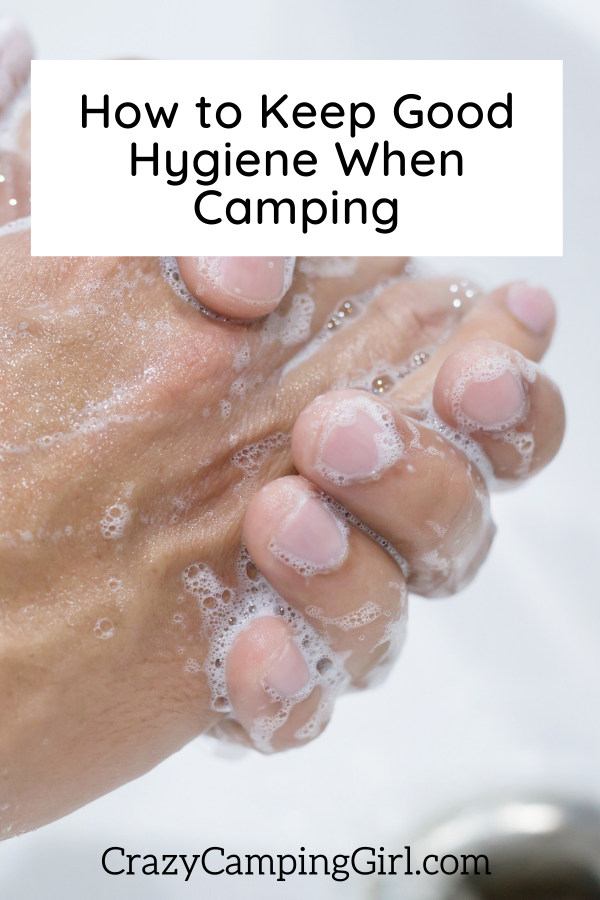
How to Keep Good Hygiene When Camping
We may earn money or products from the companies mentioned in this post.
Camping and backpacking for a few days and nights can make a hiker dirty. Certain rituals to stay clean have been used and are known to work when you are looking at Good Hygiene When Camping.

Enjoying the outdoors doesn’t mean being dirty. Backpackers and campers can stay clean enough to be healthy. Certain fungi and illnesses can occur when not keeping good hygiene.
How to Keep Good Hygiene When Camping
Essential Ways to Stay Clean
Good Hygiene When Camping really isn’t that difficult. Showers are usually not available when camping or backpacking, so there are a few basic ways to stay clean.

- Removing shoes and socks at least once a day will allow feet to breathe. Keeping shoes on could cause a foot fungus known as “athlete’s foot” to flare. This could occur due to feet being in a warm and moist area like a shoe for an extended time. Changing your socks every day is also a way to avoid athlete’s foot.
- Keeping toenails clipped flat instead of rounded will avoid toes and toenails to become jammed in shoes.
- Using mouthwash will kill bacteria that are grown in the mouth when not brushing for long periods. Some mouthwash, such as Listerine, is also known to act as a mosquito repellent.
- Cleaning wipes or biodegradable soap will ensure body cleanliness.
- Bringing plenty of clean underwear and feminine wipes for women will decrease the possibility of private infections.
- Biodegradable toilet paper is needed when nature calls. Using leaves and other natural materials could cause severe infections or diseases.
How to Relieve One’s Self in a Clean Way
First, find out what the local area managers recommend for hygiene practices that will do the least amount of damage to the environment. In particular, national, state, and provincial parks sometimes have guidelines as well as strategically located, maintained outhouses, positioned to minimize the damage to the surrounding land and water.
Susceptible areas (e.g., alpine meadows) call for extremely low-impact behavior, including carrying all waste out of the area. Check with local park and area managers for information.
Here are some suggestions for unregulated areas that are not particularly sensitive to the impact of backpacking and camping.

Unlike most mammals, humans do not need to mark their territory by urinating. Urinating can attract wild animals such as bears and mountain lions.
- Urinate or waste your feces at least three hundred feet away from the campsite and far away from the water source.
- Urinating on a rock is best because when the sun dries it up, salt is left on the rock for Deer and other wild animals to enjoy.
- Feces need to be dumped in a hole and buried to ensure wild animals to stay away from the camp.
- Using biodegradable toilet paper is best. To keep odor away, the biodegradable toilet paper needs to be buried after use.
- Moist wipes for use after relieving yourself will guarantee cleanliness and freshness.
More Tips to Ensure Freshness
When coming across a cold and clear creek, strip down to undergarments and lie in the water to cool off the body and clean out closed areas such as the underarms. Wetting hair will dispose of the grease that forms from the scalp.
Biodegradable soaps for the hair and body are sold and are the only types to be used in natural waters. Certain chemicals in regular soaps can kill wildlife.
Staying clean is very important, especially when out in the wild and exposed to a different environment. The above steps and remedies will keep one fresh and able to enjoy the outdoors.
Other posts you may find helpful if you like Good Hygiene When Camping :
- How to Keep Bears Away From Your Campsite
- Camping Tips for Beginners and City Slickers
- Camping with Small Dogs
- How to Camp Comfortably and Eat Well Outdoors
- Camping Music for the Modern Camper
- 40 Great Hobo Packets for Camping
